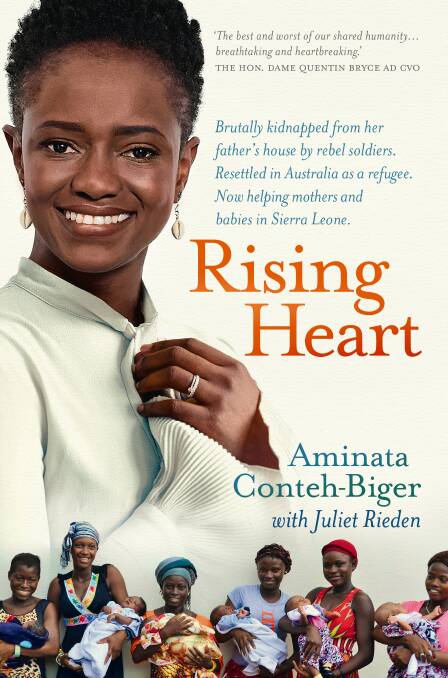
- Rising Heart, by Aminata Conteh-Biger. Macmillan Australia. $34.99.
Aminata Conteh-Biger has written a remarkable account of her experiences in Sierra Leone and Australia. Along the way, she describes both extreme brutality and the difficulties experienced by refugees, but the overall message of the book is one of hope and strength.
Subscribe now for unlimited access.
or signup to continue reading
The author came from a relatively affluent background in Sierra Leone. She recounts aspects of her childhood with great affection. The main person she recalls is her father, who encouraged all his children to get an education. "If anything, Papa paid us girls more attention...He believed that education was crucial, so we could choose what we did with our lives..." The descriptions of the author's house, her time at a very English-style boarding school and the beauty of Sierra Leone are captured in vivid images and engaging prose.
The civil war in Sierra Leone at first seemed very distant to the author, but it gradually impacts upon her life. Eventually, she is kidnapped and subject to violent abuse at the hands of a rebel fighter. Her harrowing account of these months and the way that things could never return to the way they were before the war make for unforgettable reading. Conteh-Biger realised that she needed to get away from her homeland, to somewhere far away, and there was nowhere further away than Australia.
The description of Sydney by the newly arrived refugee is fascinating. She writes that "The streets and buildings was so different, and everything looked big and perfect. But it didn't feel shocking to me because I knew this sort of place from my James Bond movies." Unfortunately, the author is subject to harassment which triggers memories of her abuse during the war. Apart from this, the many mundane difficulties facing refugees are detailed. She talks about the expectations placed on refugees to look 'downtrodden, sad and defeated all the time', and how some people expect refugees to share their whole life story immediately.

As an account of the often unthinking comments and racism experienced by refugees, the book deserves a wide readership. For example a counsellor tells Conteh-Biger, "I understand. I understand what you've been through", without having listened to the author, just based on general knowledge. Conteh-Biger also writes that "I believe there isn't a single refugee in this country who isn't grateful. ...But as a refugee you can feel like you should always be grateful and never complain about anything, be it the language, the environment, even a badly brewed coffee or a rainy day..."
The author's early attempts to get a job modelling and being ripped off make for sobering reading. However she succeeds in finding employment, and works in the retail industry for many years. She finds a church that had 'a joyfulness to it'. Indeed, her faith in even the darkest moments is a real presence in her story. And gradually she finds her own voice again. She becomes involved in producing a theatre work dealing with the experiences of refugee women which allows her to reveal some of her what time experiences in a way that has previously being impossible. She makes deep friendships. She eventually finds love and becomes a mother .
While giving birth to her first child in Sydney in 2012, Aminata Conteh-Biger and her child almost die, only surviving due to first-rate medical care. This leads her to reflect on the appalling rates of maternal mortality in Sierra Leone. About one in eight women die giving birth there. All her life, she "believed that my destiny was to be of service to others". But her survival of the difficult birth lead to an "epiphany". She sets up a charitable organisation known as the Aminata Maternal Foundation to improve women and babies' survival rates at birth. The Foundation also provides services such as repairing fistulas.
Throughout the book, her energy, commitment and optimism shine through. After reading of her experiences during the war many would find it understandable that she totally focused on herself and her immediate family. But she has gone beyond this to also improve things in her home country. Her visits back to Sierra Leone and experiences at the facilities that the Foundation is funding is a real highlight of the book. At the same time, she also describes the ongoing problems caused by the war, and some positive political developments.
This is a moving and memorable book. It is a timely reminder of the many refugees in the world who are stuck in limbo, and also the difficulties they face in their adopted countries. More than anything, it is the story of one remarkable woman. Aminata Conteh-Biger writes that "Part of my head will always be back in the mountains of Sierra Leone with the rebels. But I refuse to be their captive." The book also delves into the notion of forgiveness; what does it mean to forgive? Who does it benefit?
Rising Heart is valuable in giving a refugee's view of Australia and in telling of a war that many Australians will know little about . It was a privilege to read this engaging book and to share a little of the life of such a dynamic woman. Part of the author's royalties will be donated to the Aminata Maternal Foundation.
- Penelope Cottier writes poetry as PS Cottier

